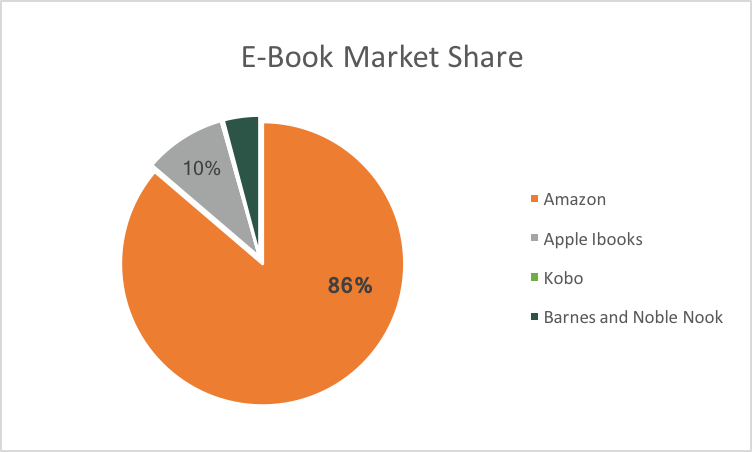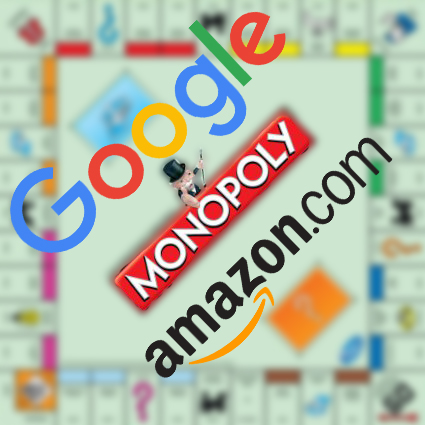When was the last time you used a search engine other than Google? When was the last time you bought a book online from somewhere other than Amazon?
You probably can’t think of a time because Amazon and Google essentially have monopolies over their respective corners of the internet. While we might notice how are choice of airline or cable company is extremely limited, we recognize less the monopolistic qualities of these internet giants.
Just because Google and Amazon don’t look like what we picture a monopoly to be it doesn’t mean they don’t have monopoly power.
A Brief History of Antitrust in the United States
In order to look at whether these tech giants have monopoly power we need to look historically at the laws designed to prevent this kind of power.
The United States Congress passed the Sherman Antitrust Act in 1980 in an effort to prevent companies from having monopolies that stifle competition, harm consumers or raise prices. The Sherman Act along with the subsequent Federal Trade Commission Act and Clayton Act are the core of American antitrust law.
These antitrust regulations were enforced fairly aggressively by the Justice Department from the 1930s until the 1960s. Then came Robert Bork, the Yale Law professor and supreme court nominee. Bork argued that the main concern of regulator should be solely if prices for the consumer were dropping. His ideas became the policy of the US Department of Justice when he became solicitor general under Richard Nixon and they have remained the mindset of the government until today. Bork’s ideas on antitrust are at the center of American antirust regulation enforcement. His influence is the reason why there has been a decline in antitrust regulation enforcement over the last 50 years.
In Move Fast and Break Things Jonathan Taplin argues that Amazon, Google and Facebook would all be prosecuted under antitrust laws if it weren’t for Bork.
Are Google and Amazon Monopolies?
When you think of a monopoly Google or Amazon are probably not what you picture. You might think of the oil and steel barons of the late 19th and early 20th century or the telecomm monopoly AT&T once had. Or you might even think of the board game Monopoly.
Unlike the traditional monopolies, Google and Amazon lack a tangible product. They don’t have physical control over all production of steel or ownership of all phone lines. With Google or Amazon there isn’t anyone and anything standing in the way of someone creating a new search engine or e-book market. Their businesses lie within cyberspace they aren’t necessarily tangible. In a way, they have a monopoly of eyes. They have majority control over the platforms people use to consumer information of buy things online. They have a monopoly of users.
Legally, The Supreme Court of the United States has defined monopoly power as “the power to control prices or exclude competition,” this definition also includes an assumption that the company has a majority market share. Using this legal definition as a guide let’s see if Amazon and Google have monopoly power.
Amazon and Alphabet, Google’s parent company, have many different aspects of their businesses. Therefore, we will only look at one part of each of company. For Google, we will look at search and search for advertising. For Amazon, we will be analyzing the e-book market.
86% of all e-book sales in the United States occurred on Amazon in 2016, according to Authors Earnings’ February 2017 report. Amazon clearly has majority market power. They have the ability to control prices or even stop all books from a publisher from being sold on Amazon. Since they are the largest marketplace for e-books it would be detrimental for a publisher if their books were not sold on Amazon.

Source: Author Earnings
In 2014, Amazon and Hachette, a publisher, were in a dispute over pricing Amazon stopped all presales of Hachette books and caused shipping delays. In this case Amazon was exhibiting more monopsony qualities, when one buyer controls a market, because through their control of the distribution of books they are the largest buyer of books. Since Amazon is the largest book, online and print, seller Hachette was forced to bend to Amazon’s will. Hachette was ultimately able to win a little and in the resulting deal with Amazon was able to gain more control over how their e-books are priced on Amazon. As a whole because Amazon occupies such a dominant share of the e-book market its sheer dominance allows it to set prices.

Source: Stat Counter
Google, like Amazon with their sector, holds a large majority of the search market. According to Stats Counter, in September 2017 Google had an 85% market share of internet search in the United States. Google overwhelming dominates the search market This means they are also able to have market power over search advertising. Alphabet and Facebook essentially have a duopoly over all online advertisings with more the 60% of all internet ad revenue, according to an analysis by Reuters of their quarterly reports.
Google has such control over the search market that it excludes all other competitors. Even if some other search engine all of a sudden became a better search engine they wouldn’t be able to succeed because Google has control over the search engine market.
Further proof of the market consolidation of the search market is the Hergindhal-Hirschman Index (HHI) score, which measures the concentration in a particular market. Antirust agencies consider a market with a score of 2,500 to be highly concentrated. The search market has a score of 7,402, off the charts.
While Google and Amazon may not look like what we picture a monopoly to be the exemplify all the qualities of monopoly power.
Are These Monopolies Good?
Google and Amazon essentially have monopoly power over their respective corners of the internet market, but is this power a bad thing?
For the consumer Amazon’s immense control over the e-book market looks like a good thing because it produces lower prices. Bork would argue that Amazon’s monopoly power is a good thing because it lowers prices for consumers. However, the Bork line of thought fails to consider is possible effects of a monopoly power beyond the price consumers pay. As we saw with the Amazon-Hatchett dispute of 2014, Amazon has the ability to undermine the supply chain of e-books. There might be positive effects for the consumer, but Amazon’s power can harm publishers and authors.
Monopoly power can also lead to a stagnation in innovation. If a company does not have another company with the potential to compete with them there is no motivation to innovate. If you have such a large market share there is no incentive or need to innovate to get new users or to maintain your exciting user base.
For example, even if Bing had a substantially better product it would still barley make a dent in Google’s user base. It wouldn’t lead to Google to innovate as well, because their market power is so large and strong. Without competition, users lose out on getting better products and futures.
An example of the positive results of having a competition can be seen with Facebook and Snapchat. Facebook is the most successful and popular social media platform, but Snapchat has had a growing user base and also the love of investors. Facebook tried to buy Snapchat for $3 Billion, but Snapchat turned them down. By not consolidating Facebook and its subsidiaries, including Instagram, became a competitor of Snapchat. Facebook felt like it had to compete. This has led to each company having to innovate.
Facebook chose to basically copy Snapchat’s features as their method of innovation to try and protect their existing user base. Meanwhile, Snapchat is trying to develop new features to draw more users in. An example of this is Snapchat and Instagram stories. Instagram introducing stories was clearly an attempt to copy Snapchat stories, but in order differentiate themselves from Snapchat Instagram had to try and create a better version of stories. While Instagram stories was more of a cloning than an innovation it was still Instagram having to develop new features to be competitive. In the end though, it seems like Facebook’s cloning of Snapchat features has just allowed them to gain more market power. Currently Snapchat has the largest share of new users, but their share of new users is shrinking and Instagram’s is growing. Overall, this competition between Facebook and Snapchat benefits the consumer.
How to Deal with These Monopolies
Those who align with Robert Bork would argue that there is no need to break up Amazon or Google, because the prices for consumers are not being raised. In the case of Google there was never even a price paid by consumer.
But as we explored there are downsides to these monopolies, so what should we do about them? Are our antitrust laws from over a century ago built to regulate companies with products the bills’ author could have never imagined?
Jonathan Taplin has purposed a series of possible ways to break up or regulate digital monopolies like Amazon and Google. In a New York Times opinion piece, he laid out three possible regulatory options: option one is to block the major digital players from acquiring each other. Another possibility is to treat them like public utilities—which would require them to license out their patents. Or a third option would be to remove the “safe harbor” clause from the 1998 Digital Millennium Copyright Act, which according to Taplin allows companies “to free ride on the content produced by others.”
Actually, breaking portions of these new monopolies would require the Justice Department to return to its pre-Bork hardline position on antitrust. So maybe the best way to deal with these tech monopolies is to institute some creative regulations to curtail some of the more negative effects of their monopoly power.
Sources:
https://www.nytimes.com/2014/11/14/technology/amazon-hachette-ebook-dispute.html
http://fortune.com/2017/07/28/google-facebook-digital-advertising/
https://www.recode.net/2017/9/19/16308788/snapchat-instagram-sign-ups-new-users-us-global



Leave a Reply
You must be logged in to post a comment.